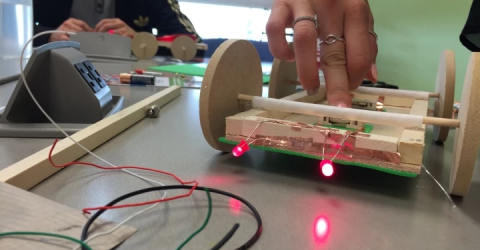
By: Janette Hughes and Laura Morrison
Janette is Canada Research Chair in Technology and Pedagogy and Associate Professor at the Faculty of Education, University of Ontario Institute of Technology.
Laura is a Sessional Instructor and STEAM3d Lab Manager at the Faculty of Education, University of Ontario Institute of Technology.
The STEAM-3D Lab is where Dr. Janette Hughes, Canada Research Chair in Technology and Pedagogy, and her research team: 1) develop and evaluate constructionist “production pedagogies” that work to build students’ ‘performative’ competencies in digital literacies, and investigate whether and how they promote civic engagement, service learning, and social justice particularly among marginalized students; 2) observe and evaluate the impact of “maker cultures” that facilitate the discovery, design, and development (3Ds) of digital “products” for students of all ages, their teachers, and the community; and 3) build capacity for investigating and affecting change and innovation in formal and informal education settings in the use of emerging digital media and interactive tools.
Making with Preservice Teacher Candidates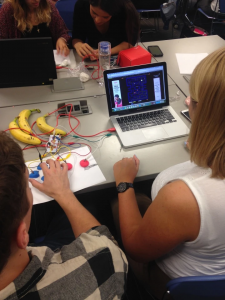
At the beginning of this new B.Ed. year — the first of the new two-year program in Ontario — we wanted to introduce the teacher candidates to a new way of teaching and learning early on as part of our effort to emphasize inquiry-based, digital learning. As a result, our STEAM-3D lab collaborated with other faculty members to organize a Makerspace Day for I/S and P/J students. The sessions included: Making with Makey Makey where teacher candidates created tangible controllers for Scratch games and animations; e-textiles & circuits, where students were given materials such as conductive thread, fabric, sewing materials, copper-wire tape and LEDs, a brief intro to circuits and tutorials guiding them on what they could possible create. Within the half-hour session, many students were able to create (with limited, or no background in circuits or e-textiles): LED-embedded bracelets, mini, LED-embedded stuffed animals and LED-embedded paper-based art pieces; 3D printing where students learned Tinker and printed small 3-D objects and tangible construction where students planned/designed an object, like a car or bridge, and constructed it using wood and glue in the session. Many students then took what they created in this session and embellished their pieces in the circuits session with LED lights (such as a car with headlights).
Makerspace pedagogies encourage and pro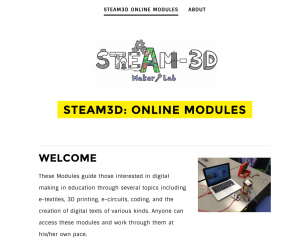 mote perseverance, resiliency, problem-solving and an approach that supports learning from “failure”. Before and during the sessions we emphasized process work through reflection and collaboration and tried to de-emphasize final products.
mote perseverance, resiliency, problem-solving and an approach that supports learning from “failure”. Before and during the sessions we emphasized process work through reflection and collaboration and tried to de-emphasize final products.
After the Makerspace Day, Online Maker Modules were developed for the purpose of in-service and pre-service teacher professional development. The modules include: Digital Making theory; Circuits; Wearables; 3-D printing; Coding; Gaming & Programmable Robots. Within each of the modules, students are asked to complete: research articles, self-directed learning walkthroughs and tutorials, additional media to support learning and differentiated assignment options. To view the online modules see: http://steam3d.weebly.com/ Currently, selected B.Ed. and M.Ed. students are working through the modules at their own pace and come into the lab at designated times to work with the maker tools, learn collaboratively and possibly complete one of the various field activities attached to the modules.
Current Research in Digital Making
In addition to the Maker Modules pilot study, we are working with a local, high-needs elementary school to create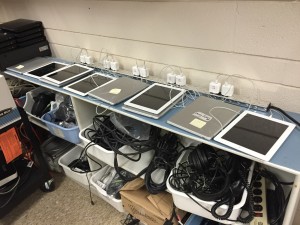 a Makerspace Club. This project, part of a SSHRC-funded partnership development grant, focuses on the use of makerspace pedagogies to address school-community issues, including an anti-bullying initiative led by Dr. Jennifer Laffier. Included in the project is the creation of a school-based anti-bullying team that is student-led. The idea behind the initiative is for students in the maker club to become the ‘agents of change’ amongst their peer groups and to demonstrate their leadership and agency through the creation of different digital projects related to bullying prevention (ie. light-up LED bracelets, infographics, anti-bullying videogames using Scratch and Makey Makey). In Part II of the club, math professor Dr. Ami Mamolo will be guiding the students in understanding the math/numbers behind infographics — how to critically read and understand an infographic and how to create one. In this context, the students will create infographics connected to the statistics and data they gather on bullying in their immediate classroom and school environment, and Canada in general.
a Makerspace Club. This project, part of a SSHRC-funded partnership development grant, focuses on the use of makerspace pedagogies to address school-community issues, including an anti-bullying initiative led by Dr. Jennifer Laffier. Included in the project is the creation of a school-based anti-bullying team that is student-led. The idea behind the initiative is for students in the maker club to become the ‘agents of change’ amongst their peer groups and to demonstrate their leadership and agency through the creation of different digital projects related to bullying prevention (ie. light-up LED bracelets, infographics, anti-bullying videogames using Scratch and Makey Makey). In Part II of the club, math professor Dr. Ami Mamolo will be guiding the students in understanding the math/numbers behind infographics — how to critically read and understand an infographic and how to create one. In this context, the students will create infographics connected to the statistics and data they gather on bullying in their immediate classroom and school environment, and Canada in general.
Upcoming Projects
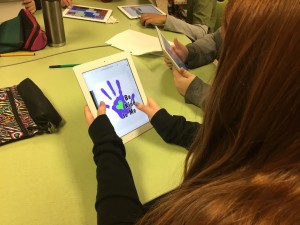 We are now in the process of planning for a STEAM Makerspace Camp, which we will be offering this March Break to local students. The camp will run for the five days of the March Break (Mon. March 14 – Friday March 18) and will be divided into morning and afternoon sessions, where the mornings will concentrate more heavily on math and the afternoons — on literacy (all in relation to makerspace environments, pedagogies and tools). In the math and coding morning sessions, participants will learn to code and to create their own video games and animations. This will be run by a visiting math and coding expert, Iain Brodie, and is co-sponsored by The Fields Institute for Research in Mathematical Sciences. The afternoon sessions will have a literacy and arts focus where participants will learn how to use various makerspace tools like circuits, 3-D printers and e-textiles and they will use these tools to create unique projects connected to an exploration of the self and “positive power”. Students will make, for example, infographics to explain who they are, they will use Scratch and Makey Makey to represent individual strengths and paper circuit creations using Chibitronics to represent positive power. LilyPad and LittleBits will also be used to demonstrate friendship and connection, and 3-D printed symbols will be created to represent learning over the course of the week. Embedded and emphasized in the whole learning/creation process are: collaborative learning, troubleshooting/problem-solving and reflective practice. Students will be asked to complete periodic self check-ins recorded in journals or in audio and/or video interviews where they reflect back on the process in order to fix problem areas (related to task process work and also inter- and intrapersonal process work).
We are now in the process of planning for a STEAM Makerspace Camp, which we will be offering this March Break to local students. The camp will run for the five days of the March Break (Mon. March 14 – Friday March 18) and will be divided into morning and afternoon sessions, where the mornings will concentrate more heavily on math and the afternoons — on literacy (all in relation to makerspace environments, pedagogies and tools). In the math and coding morning sessions, participants will learn to code and to create their own video games and animations. This will be run by a visiting math and coding expert, Iain Brodie, and is co-sponsored by The Fields Institute for Research in Mathematical Sciences. The afternoon sessions will have a literacy and arts focus where participants will learn how to use various makerspace tools like circuits, 3-D printers and e-textiles and they will use these tools to create unique projects connected to an exploration of the self and “positive power”. Students will make, for example, infographics to explain who they are, they will use Scratch and Makey Makey to represent individual strengths and paper circuit creations using Chibitronics to represent positive power. LilyPad and LittleBits will also be used to demonstrate friendship and connection, and 3-D printed symbols will be created to represent learning over the course of the week. Embedded and emphasized in the whole learning/creation process are: collaborative learning, troubleshooting/problem-solving and reflective practice. Students will be asked to complete periodic self check-ins recorded in journals or in audio and/or video interviews where they reflect back on the process in order to fix problem areas (related to task process work and also inter- and intrapersonal process work).

